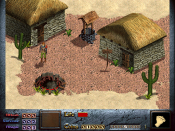Reply to DinkC Validator public beta
If you don't have an account, just leave the password field blank.
Those few of you who remember my previous post about this, may recall that I tried to keep it secret at all cost. Well, now the alpha period is over, and it's beta test time. I'm not just looking for a few select beta testers. I'm putting the beta out in the open for everybody to test.
Like the name in the subject says, this thing validates DinkC scripts. It aims finding all kinds of errors in DinkC scripts, from missing semicolons at the end of lines, to "else"s appearing before "if"s. This beta isn't entirely complete, though, so it doesn't validate parameters of functions yet. (Such as that say() should have a string, and a sprite number, and nothing more, nothing less.)
I want you to report any kind of anomalies with the program. If it finds an error that is not an error, please report that. However, what's more important is when it doesn't find an error that it should've found. So please, put this program through scrutiny by testing all kinds of sick and twisted DinkC constructs you can come up with through it.
You can download the program from my site. Save it to a folder of its own, and extract it. A decent extractor, like WinRAR should be able to handle tar.bz2 files. You run the program by starting the command prompt, and change the directory to the one where you extracted the files, and then issue the command "java -jar dinkValidator.jar <path-to-dinkc-file-to-test>". I'm not certain that the path can contain spaces or not. You'll find out soon enough.
The final version will have a GUI, so you won't have to worry about these things if you wait. However, I will need to have some people to test this for me before I start doing the necessary stuff for the final release, so please give it a go if you have time.
Just like last time, the program requires you to have or install the Java Runtime. If you're certain you don't have it, you can download it at that link.
If you are sure you have it, you must also make sure that the path to the java binaries are in your PATH environmental variable. Instructions for doing this can be found here.
KNOWN ISSUES:
* Global variables will be reported as "possibly uninitialized variables"
* Calls to own methods will give an error
Like the name in the subject says, this thing validates DinkC scripts. It aims finding all kinds of errors in DinkC scripts, from missing semicolons at the end of lines, to "else"s appearing before "if"s. This beta isn't entirely complete, though, so it doesn't validate parameters of functions yet. (Such as that say() should have a string, and a sprite number, and nothing more, nothing less.)
I want you to report any kind of anomalies with the program. If it finds an error that is not an error, please report that. However, what's more important is when it doesn't find an error that it should've found. So please, put this program through scrutiny by testing all kinds of sick and twisted DinkC constructs you can come up with through it.
You can download the program from my site. Save it to a folder of its own, and extract it. A decent extractor, like WinRAR should be able to handle tar.bz2 files. You run the program by starting the command prompt, and change the directory to the one where you extracted the files, and then issue the command "java -jar dinkValidator.jar <path-to-dinkc-file-to-test>". I'm not certain that the path can contain spaces or not. You'll find out soon enough.
The final version will have a GUI, so you won't have to worry about these things if you wait. However, I will need to have some people to test this for me before I start doing the necessary stuff for the final release, so please give it a go if you have time.
Just like last time, the program requires you to have or install the Java Runtime. If you're certain you don't have it, you can download it at that link.
If you are sure you have it, you must also make sure that the path to the java binaries are in your PATH environmental variable. Instructions for doing this can be found here.
KNOWN ISSUES:
* Global variables will be reported as "possibly uninitialized variables"
* Calls to own methods will give an error









